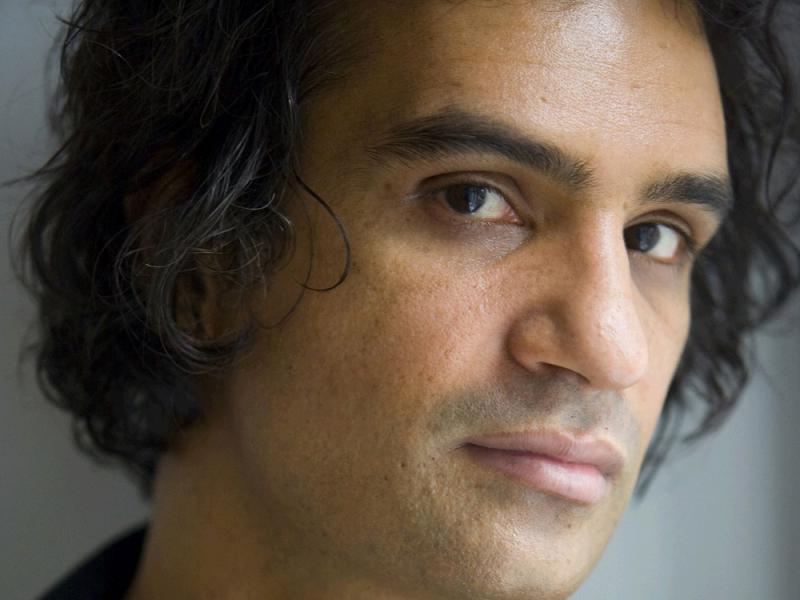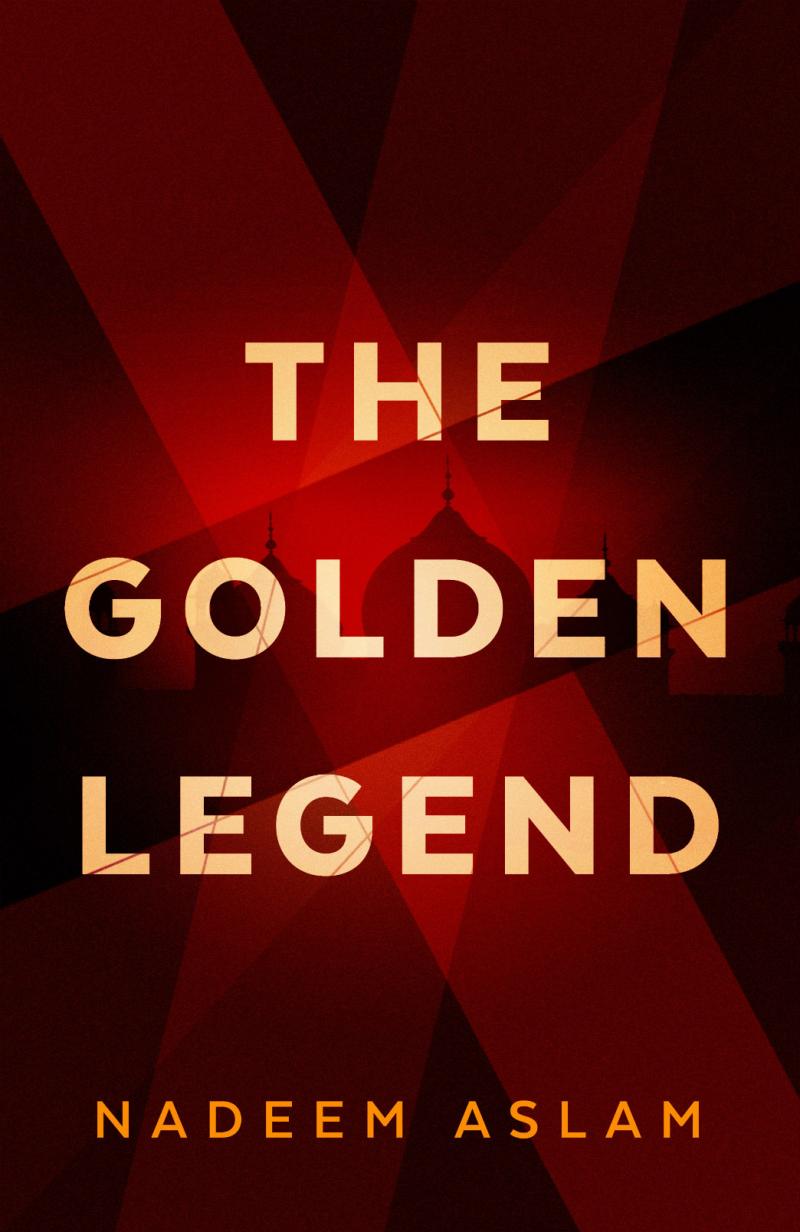Sunday Book: Nadeem Aslam - The Golden Legend | reviews, news & interviews
Sunday Book: Nadeem Aslam - The Golden Legend
Sunday Book: Nadeem Aslam - The Golden Legend
Elegant but nostalgic exploration of Pakistan's multicultural heritage

Elegant literary romance and contemporary jihadism are unlikely bedfellows. Yet British-Pakistani novelist Nadeem Aslam has now written a third novel combining the two. While The Blind Man’s Garden (2013) and The Wasted Vigil (2008) were partially set in Afghanistan, The Golden Legend is set in the fictional city of Zamana, somewhere on the Grand Trunk Road in northern Pakistan.
Two families are at the centre of the story, a middle-class Pakistani architect couple, Massud and Nargis, and their poor Christian neighbours, Lily (a man), Grace and their daughter Helen. Nargis was born Christian Margaret, her uncle the bishop of Lyallpur, and she changed both name and religious identity to fit in better when getting to know her husband. Their district, Badami Bagh, used to be an almond orchard, and as the city grew in the 1950s became a Christian ghetto lived in by that poor community of cleaners or servants. First of the weighty pieces of symbolism comes in the form of the ghost of a mutineer, hanged from one of the almond trees by the British. Memory of traumatic injustice hangs heavily over Zamana.
There’s even a touch of indulgence about Aslam’s retreat into a fragrant, nostalgic reverie
Massud and Nargis have large models of the Hagia Sophia and Great Mosque of Córdoba in their house, both buildings that have been shared by different religions at various times, and emblems of of the colourful, tolerant, multicultural past that used to exist (apparently) so harmoniously in Pakistan. They built a mosque of their own on an island outside the city, intending that it be used by multiple strands of Islam, as well as Christians and Hindus. After an intolerant mob swarm Badami Bagh, what’s left of the family hides there, though such is Aslam’s pessimism about the condition of Pakistani society that this island mosque - another loaded symbol - is not immune to sectarian violence.
Perhaps the most important symbol of all is Massud’s prize possession, a kind of miscellany which was written by his father as a “celebration of the countless ideas and thoughts that had travelled over the ages from one part of the planet to the other… the hidden or forgotten contributions that one set of humans had made towards the happiness of another”. This precious tome, a bold statement of Aslam’s favoured cultural liberalism, is vandalised by the secret service when searching the house, then painstakingly sewn back together by Nargis and friends for the rest of the novel. The symbolism needs little explanation.
Aslam has created three dynamic female characters, all of whom fight the entrenched polarisation of cultural identity that an angry and simple-minded society is demanding. (The marginalisation of women was a criticism of both The Blind Man’s Garden and The Wasted Vigil.) In particular, all three are spirited lovers, and all three relationships in the main part of the story are between Muslims and Christians. Love, and the other finer human instincts, such as charity, kindness and hope, transcend religious identity, Aslam argues.
 It’s difficult to comment more specifically about the plot without giving too much away. Lily’s wife Grace has been murdered before the novel begins, and Massud is shot accidentally by a suspect American secret serviceman soon afterwards. Thereafter, the tolerant community of Badami Bagh is menaced by ever more fearsome bigotry, until a suicide bombing at the (again, famously liberal) Charagar mausoleum, and finally the discovery of Nargis’ hiding place in her disused mosque on the island finally rout the representatives of tolerance and diversity.
It’s difficult to comment more specifically about the plot without giving too much away. Lily’s wife Grace has been murdered before the novel begins, and Massud is shot accidentally by a suspect American secret serviceman soon afterwards. Thereafter, the tolerant community of Badami Bagh is menaced by ever more fearsome bigotry, until a suicide bombing at the (again, famously liberal) Charagar mausoleum, and finally the discovery of Nargis’ hiding place in her disused mosque on the island finally rout the representatives of tolerance and diversity.
A painstaking literary craftsman, Aslam is well known for drafting in longhand, then editing ruthlessly. The description, and construction of the characters and narrative, are subtle and elegant. The story is told with beautifully measured precision, its moments of languorous evocation punctured by shocking violence. The contrast between the leisured opulence of his prose and the shuddering brutality of so many lives in contemporary Pakistan is effective, here, because it’s so jarring.
Aslam is carefully even-handed with his perpetrators. There seems little to choose, morally, between British colonial atrocities, the vicious Indian occupation of Kashmir, seemingly random and high-handed acts of violent American intervention, the bone-headed malevolence of the jihadis, or the bottomless cynicism of the Pakistani military and secret service, corrupted by American interests. The presentation of causes is both relativistic and depressing. It’s an intractable mess. As a political document, however, it eventually feels rather simplistic, despite the elegance of the narration. Though it’s expressed with delicate erudition, the contrast between diversity and bigotry is nonetheless hammered home, and as a manifesto, can’t help seeming somewhat limited.
Aslam is in good company, in a rich vein of contemporary writing that falls loosely under the postcolonial banner, with (among others) Libya’s Hisham Matar and Nigeria’s Chimamanda Ngozi Adichie. He is - at least on current form - the most figurative, his fictional world rather distant and theoretical, for all its beauty. Aslam is still perhaps best known for 2004’s Maps For Lost Lovers, about violently disrupted love in an English immigrant community, a setting which - despite its occasionally murderous interventions - it is perhaps easier to depict in quotidian detail.
There’s even a touch of indulgence about Aslam’s retreat into a fragrant, nostalgic reverie about the tolerance of the broader Persian empire. One reading of the story is as mass intrusion into, and destruction of, the remaining oases of tolerant, liberal culture: Badami Bagh, the Charagar mausoleum, the island with its own mosque/church/temple. This is legend as myth, golden like the Golden Age, lamenting the decline from a luminous, learned multiculturalism to aggressive bigotry. It’s a very beautiful elegy for an ideal that died in Pakistan some time ago and won't be back any time soon.
The future of Arts Journalism
You can stop theartsdesk.com closing!
We urgently need financing to survive. Our fundraising drive has thus far raised £49,000 but we need to reach £100,000 or we will be forced to close. Please contribute here: https://gofund.me/c3f6033d
And if you can forward this information to anyone who might assist, we’d be grateful.

Subscribe to theartsdesk.com
Thank you for continuing to read our work on theartsdesk.com. For unlimited access to every article in its entirety, including our archive of more than 15,000 pieces, we're asking for £5 per month or £40 per year. We feel it's a very good deal, and hope you do too.
To take a subscription now simply click here.
And if you're looking for that extra gift for a friend or family member, why not treat them to a theartsdesk.com gift subscription?
more Books
 'We are bowled over!' Thank you for your messages of love and support
Much-appreciated words of commendation from readers and the cultural community
'We are bowled over!' Thank you for your messages of love and support
Much-appreciated words of commendation from readers and the cultural community
 Justin Lewis: Into the Groove review - fun and fact-filled trip through Eighties pop
Month by month journey through a decade gives insights into ordinary people’s lives
Justin Lewis: Into the Groove review - fun and fact-filled trip through Eighties pop
Month by month journey through a decade gives insights into ordinary people’s lives
 Joanna Pocock: Greyhound review - on the road again
A writer retraces her steps to furrow a deeper path through modern America
Joanna Pocock: Greyhound review - on the road again
A writer retraces her steps to furrow a deeper path through modern America
 Mark Hussey: Mrs Dalloway - Biography of a Novel review - echoes across crises
On the centenary of the work's publication an insightful book shows its prescience
Mark Hussey: Mrs Dalloway - Biography of a Novel review - echoes across crises
On the centenary of the work's publication an insightful book shows its prescience
 Frances Wilson: Electric Spark - The Enigma of Muriel Spark review - the matter of fact
Frances Wilson employs her full artistic power to keep pace with Spark’s fantastic and fugitive life
Frances Wilson: Electric Spark - The Enigma of Muriel Spark review - the matter of fact
Frances Wilson employs her full artistic power to keep pace with Spark’s fantastic and fugitive life
 Elizabeth Alker: Everything We Do is Music review - Prokofiev goes pop
A compelling journey into a surprising musical kinship
Elizabeth Alker: Everything We Do is Music review - Prokofiev goes pop
A compelling journey into a surprising musical kinship
 Natalia Ginzburg: The City and the House review - a dying art
Dick Davis renders this analogue love-letter in polyphonic English
Natalia Ginzburg: The City and the House review - a dying art
Dick Davis renders this analogue love-letter in polyphonic English
 Tom Raworth: Cancer review - truthfulness
A 'lost' book reconfirms Raworth’s legacy as one of the great lyric poets
Tom Raworth: Cancer review - truthfulness
A 'lost' book reconfirms Raworth’s legacy as one of the great lyric poets
 Ian Leslie: John and Paul - A Love Story in Songs review - help!
Ian Leslie loses himself in amateur psychology, and fatally misreads The Beatles
Ian Leslie: John and Paul - A Love Story in Songs review - help!
Ian Leslie loses himself in amateur psychology, and fatally misreads The Beatles
 Samuel Arbesman: The Magic of Code review - the spark ages
A wide-eyed take on our digital world can’t quite dispel the dangers
Samuel Arbesman: The Magic of Code review - the spark ages
A wide-eyed take on our digital world can’t quite dispel the dangers
 Zsuzsanna Gahse: Mountainish review - seeking refuge
Notes on danger and dialogue in the shadow of the Swiss Alps
Zsuzsanna Gahse: Mountainish review - seeking refuge
Notes on danger and dialogue in the shadow of the Swiss Alps
 Patrick McGilligan: Woody Allen - A Travesty of a Mockery of a Sham review - New York stories
Fair-minded Woody Allen biography covers all bases
Patrick McGilligan: Woody Allen - A Travesty of a Mockery of a Sham review - New York stories
Fair-minded Woody Allen biography covers all bases

Add comment